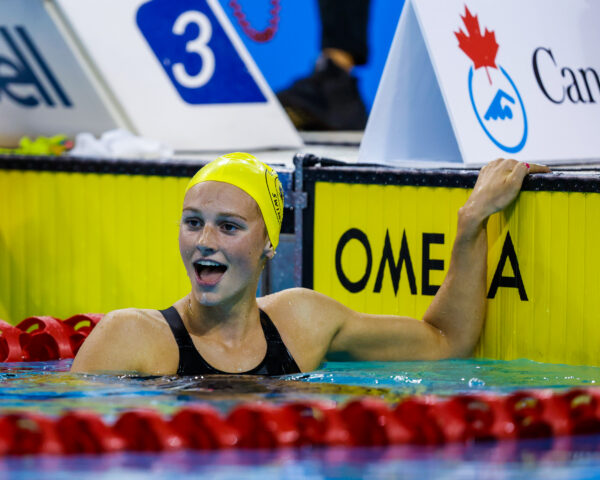By James Sutherland on SwimSwam

2024 Canadian Olympic & Paralympic Trials
- May 13-19, 2024
- Toronto Pan Am Sports Centre – Toronto, Ontario
- LCM (50 meters)
- Meet Central
- Psych Sheets
- Live Results
The 2024 Canadian Olympic Trials are set to commence next week from the Toronto Pan Am Sports Centre, as the country’s best swimmers will vie for spots on the Paris Olympic team over seven days of racing.
Below, find five key women’s storylines to follow throughout the competition:
WILL MCINTOSH SAVE IT FOR THE SUMMER?
At last year’s Canadian World Championship Trials, Summer McIntosh had the best meet of her career and one of the best domestic performances in recent memory, setting new world records in the women’s 400 free (3:56.08) and 400 IM (4:25.87) while setting World Junior and Canadian Records in the 200 free (1:53.91), 200 fly (2:04.70) and 200 IM (2:06.89).
There’s no debating McIntosh’s ability to comfortably qualify for the Olympics in all of the events listed above, the only question will be how fast she goes in Toronto.
Last year, McIntosh was significantly slower on the opening night of the World Championships in the 400 free compared to her world-record-setting swim on home soil—with Ariarne Titmus lowering the world record and McIntosh missing the podium—but rebounded to go faster in both the 200 free and 200 fly before she wasn’t too far off in the 400 IM at the tail-end of the meet (she scratched out of the 200 IM in Fukuoka).
Entering her second Olympic Trials meet, how much taper the 17-year-old will take on, along with what her final schedule will be, are the questions for McIntosh.
It stands to reason that she won’t come anywhere near a full taper given how far ahead she is of her competitors in her best events, not to mention that she consistently swims fast in-season regardless. Especially with the Trials more than one month later than they were last year, we shouldn’t expect world records in Toronto—not to say it’s impossible—with McIntosh putting all of her focus on performing in Paris.
McIntosh is entered in seven events at the Trials, one for each day:
McIntosh’s Trials Schedule
- Monday – 400 free
- Tuesday – 200 free
- Wednesday – 100 back
- Thursday – 400 IM
- Friday – 100 free
- Saturday – 200 fly
- Sunday – 200 IM
The Canadian Trials schedule doesn’t mirror the Olympics (no semi-finals in Toronto), so McIntosh won’t have the luxury of spreading out her events in Paris the way she can next week. So will she actually race the 100 back and 100 free at Trials?
The 100 back doesn’t make much sense looking ahead to Paris—she would be in tough to qualify with Ingrid Wilm and Kylie Masse in the field, and even if she did, the semi-final of the event falls during the same session as the 200 free and 400 IM finals at the Olympics.
We could see McIntosh race the 100 free, maybe just the prelims, to solidify her spot on the 400 free relay, though barring four other women being 53-mid or faster in Toronto, her spot would be locked in if she wanted it.
CAN OLEKSIAK & RUCK BE BACK AT THEIR BEST?
Penny Oleksiak and Taylor Ruck were the driving forces behind the revitalization of Canadian women’s swimming. In 2016, they became the first athletes in history born in the 2000s to win an Olympic medal as members of the Canadian women’s 400 free relay, and they went on to add a second relay bronze on the 4×200 relay while Oleksiak had a stunning individual performance with a gold medal victory in the women’s 100 free and a silver in the 100 fly.
Eight years later, Oleksiak and Ruck are now the veterans aiming to re-establish their place as two of the country’s best swimmers and push for a spot at a third straight Olympics.
Both raced at the 2022 World Championships, Oleksiak winning four relay medals and placing 4th in the 100 free and Ruck claiming two relay medals and placing 6th in the 200 free.
Oleksiak underwent surgery shortly after and hasn’t been back in top form since, while Ruck dealt with a broken hand last year and only raced one relay at the 2023 World Championships.
With both swimmers set to turn 24 in between the Trials and the Olympics, their place on the Canadian roster in Paris is up in the air next week.
Oleksiak is now training with the pro group in Mission Viejo, while Ruck joined the stacked elite squad at Arizona State.
How each of those moves has gone will be put to the test in Toronto, with both swimmers likely targeting the 100 free as their main focus for qualification. Ruck was impressive in the 50 free at the 2024 World Championships in Doha, placing 5th, so look for her there (also entered in 200 free/100 back), while Oleksiak should be in the hunt alongside McIntosh in the 200 free—depending on how training has gone.
Canada has won two relay medals at each of the last Olympics, and if that run is to continue, Oleksiak and Ruck will need to be firing on all cylinders.
BREASTSTROKE SHOWDOWN LOOMS
Breaststroke has long been the weakest link of an otherwise elite women’s medley relay in Canada, with former 100 back world champion Kylie Masse, defending 100 fly Olympic champion Maggie MacNeil and former 100 free Olympic champion Oleksiak in the lineup.
Ingrid Wilm has started to challenge Masse for the lead-off spot, and McIntosh and Ruck have served as the anchor swimmers on the last two Canadian medley relays at the World Championships.
Calling breaststroke the weak link isn’t to say it’s held Canada back, as they’ve won bronze at four straight World Championships to go along with the Tokyo Olympics.
Four different women have swum in the medley relay final over the past five Worlds and two Olympics combined, with Sophie Angus splitting 1:06.2 in both Fukuoka and Doha.
- 2024 – Sophie Angus
- 2023 – Sophie Angus
- 2022 – Rachel Nicol
- 2021 – Sydney Pickrem
- 2019 – Sydney Pickrem
- 2017 – Kierra Smith
- 2016 – Rachel Nicol
This preamble leads us into the 100 breast final at the Olympic Trials, where the victory and finals spot on the medley relay will be hotly contested after two new names recently burst onto the scene.
Alexanne Lepage won the World Junior title last year in a time of 1:06.58, ranking her #5 all-time in Canada, and Western University’s Shona Branton clocked 1:06.59 at a January meet in Luxembourg. The two swimmers went head-to-head at the U SPORTS Championships in March, with Branton (1:07.64) securing the win over Calgary’s Lepage (1:08.07).
Angus is coming off setting a best time of her own at the 2024 Worlds in Doha, going 1:06.66 to make the individual final, and the woman with the fastest PB in the field is Kelsey Wog, who went 1:06.44 back in 2020.
Also lurking is the veteran Sydney Pickrem, the relay piece on medal-winning teams at the 2019 Worlds and 2021 Olympics.
The recent rise of Lepage and Branton, the continued improvement of Angus, and the experience of Pickrem and Wog makes this a must-see race with incredibly high stakes. If two women can go under 1:06.79 in the final, Canada could send two swimmers in this event and have the option to give the medley relay to the hot hand in Paris.
JANSEN, BROUSSEAU POISED FOR SENIOR BREAKOUTS
McIntosh has stolen the headlines as the leader of the next generation of Canadian female swimmers, and rightly so. But there are a number of others who have been steadily developing and will be in the hunt for their first Olympic team.
Ella Jansen is one year older than McIntosh, but has proven to have a similar level of versatility with elite abilities across freestyle, butterfly and individual medley.
Jansen won silver in the 200 IM at the 2023 World Juniors, and picked up relay medals on the senior stage at both the 2022 Commonwealth Games and the 2024 World Championships. The 18-year-old represented Canada in the 400 free, 400 IM and 800 free relay at the 2023 Worlds, and she’ll be in the hunt to qualify for her first Olympics in multiple events.
Jansen has entered seven events, while another up-and-coming 18-year-old, Julie Brossueau, is taking on eight.
Brousseau, the 2023 Pan American champion in the 400 IM, has very similar primary events to Jansen (and McIntosh).
Jansen and Brousseau are seeded 2nd and 4th, respectively, in the 400 free, 3rd and 4th in the 400 IM, 4th and 5th in the 200 free, and 5th and 6th in the 200 IM.
With McIntosh towering over those four events, Jansen and Brousseau will go head-to-head for the second individual spot on the Olympic team, with the more experienced group such as Mabel Zavaros, Sydney Pickrem and Mary-Sophie Harvey aiming to fend off the youth movement.
Other youngsters to keep an eye on at the meet include distance freestyler Emma Finlin, a 2023 World Championship team member, 2023 World Junior team members Delia Lloyd, Ella Cosgrove, Sienna Angove and Halle West, and backstroker Madison Kryger, who is coming off a standout showing at the Canadian Open in April.
THE LAST DANCE?
The life cycle of any swimmer can be short-lived once past their mid-20s—if they make it that far—and the Olympic year has typically been a natural endpoint for athletes to call it a career.
We’re now at the point where any swimmer born in the 1990s could be on the verge of retirement, which leads us to question the future of some long-tenured names in Canadian swimming.
The veteran of the field is Katerine Savard, who has represented Canada at the past three Olympics, winning a bronze medal on the 800 free relay in Rio.
Savard, who will turn 31 shortly after the Trials, has a good chance of qualifying for a fourth Games in the 100 fly, having made the semi-finals last year at Worlds, and she’ll also be a contender in the 800 free relay.
The Club Aquatique Montreal (CAMO) swimmer has had impressive longevity, and perhaps it would be a poetic end to her career to qualify for the Olympics in the 100 fly after it was the event she made her first team in back in 2012.
The other name that comes to mind as one of Canada’s “older” elite female swimmers is Kylie Masse, who turned 28 in January and has been one of the world’s best backstrokers dating back to her bronze medal victory in the 100 back in Rio.
Masse now has a domestic challenger in the 100 back in 25-year-old Ingrid Wilm, but it seems as though she’ll keep swimming as long as her performance remains elite.
Masse is the top seed in the 100 and 200 back and should comfortably qualify for Paris in both, with a chance to add to her Olympic medal tally which stands at four after she won three in Tokyo.
Other veterans who have continued racing through multiple Olympic cycles are Sydney Pickrem, Kelsey Wog, Bailey Andison and Tessa Cieplucha. This isn’t saying it’s time for these swimmers to walk away, but their future in the sport could be dictated by what happens next week.
SwimSwam: Five Storylines To Watch At The 2024 Canadian Olympic Trials – Women’s Edition



















You must be logged in to post a comment Login